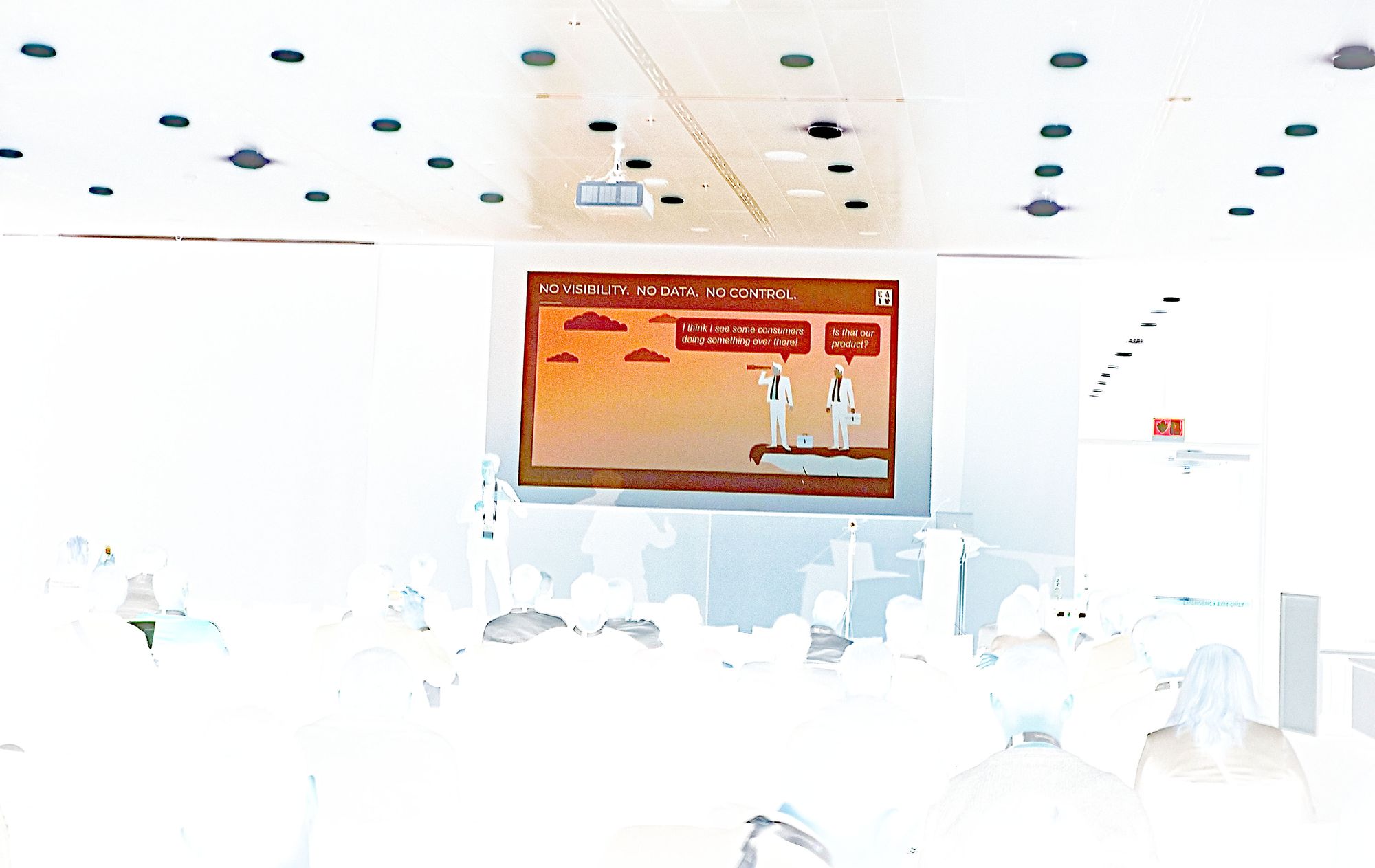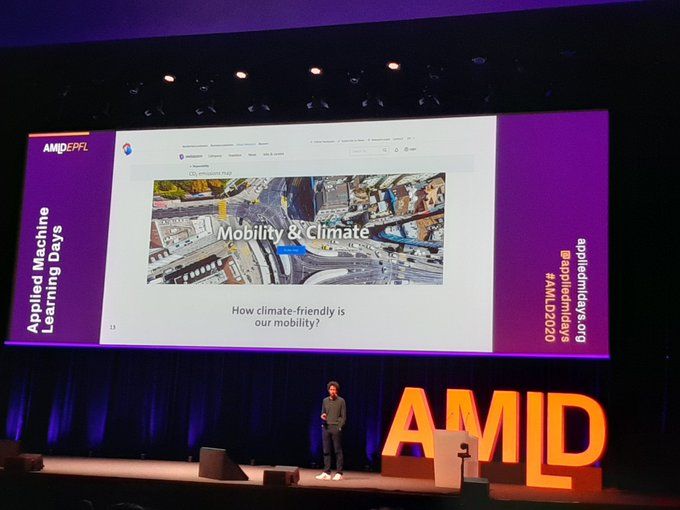063 #amld2020 #mobility

The Applied Machine Learning Days are back at the Swiss Federal Institutes of Technology of Lausanne for the fourth time. A five-day extravaganza took place with 31 hands-on sessions, 29 tracks of presentations, over 2'500 visitors. And 1 very important virtual speaker, Edward Snowden. Excellent in-depth coverage was done (in French) by media partner Heidi.news, who ran extra interviews on site. The previous two years have already been discussed on my blog (#038 #050 #051).
Ready to dive in after my gig in Bern on Friday with lots of ideas and inspiration, such is my luck, that I missed most of the conference this year on the road. Consolingly, there was an enormous amount of coverage on social media, and it was easy to get caught up in the enthusiasm and quality insights being shared.
This is at the heart of what we’re trying to do at #AMLD2020!
— Marcel Salathé (@marcelsalathe) January 26, 2020
"What I cannot create, I do not understand”. https://t.co/usuSqZpSKk
Get ready for a barrage of tweets {:-)
#AMLD2020 featured far too many incredible references to list in a single blog. You will find tons of content for health, climate change, policy, etc. I will share a few samples from just one domain of focus - urban data. There was, for instance, an introduction to scikit-mobility, a sweet Python package for analysis of data about people on the move:
Human mobility workshop @appliedmldays #AMLD2020 by @lucpappalard @GianniBarlacchi @Pellungrobe & @iPif: Scikit-mobility allows you to process mobility data as trajectory & flow dataframes and perform a wide range of analyses as easy as using pandas #skmobhttps://t.co/5nC5PDJ2Sy pic.twitter.com/fy7BGRAtXL
— Samin Aref (@saminrf) January 25, 2020
A clearly intriguing discussion of sustainable urbanization took place, posted here by Datamap - who also presented their own ML-based mobility tracking application and data producer cooperative that I'm very excited to be involved in.
Great talk from @efesce: "Leveraging ML for sustainable urbanization" at #AMLD2020
— Datamap (@datamapio) January 28, 2020
Glimpses: pic.twitter.com/49srAV76nY
There were eye opening perspectives from Mohamed Kafsi, who works on embedding climate change thinking into machine learning at Swisscom, and with whom I had a pleasant conversation at the stand:

Thank you to Konstantin Klemmer for spending some time with me in the break to share some key takeaways from the track on A.I. and Cities that he (very capably, by all accounts) facilitated. "We must not separate social systems thinking from investigation of cities", he said, and in this thread, shares insights from the people behind transformational projects:
1/? Beyond our awesome contributed talks, we'll have a bunch of amazing invited talks and further collaborations at #AIandCities. In the coming days, I will present some of our highlights on this Twitter thread, so stay tuned: https://t.co/B4kqahtM9C @appliedmldays
— Konstantin Klemmer (@kklmmr) January 6, 2020
#AMLD2020 pic.twitter.com/rGpDsiZdUa
A lot of themes fundamental to the engineering side of machine learning were discussed. I recalled the data quality and consistency issues that Martin Veterli memorably introduced last years event when I saw this:
A missing value tour by @JulieJosseStat . I love the quote “one of the ironies of big data is that missing data play an ever more significant role.” This is so true! #AMLD2020 pic.twitter.com/4OMClpXtnN
— Florent F. Garcin (@ffgarcin) January 26, 2020
From "systematic confusion about technology with intention", to stunning glimpses of where the next breakthrough might lead us ...
Road towards a theory of neural networks? Amazing statistical physics approach to understanding NN by @zdeborova at the AI & Physics track of #AMLD2020 pic.twitter.com/QqCaqSMMP8
— Remy Kusters (@RemyKusters) January 28, 2020
And the increasing influence of ML on the social sciences ...
"Instead of randomly assigning the refugees across 26 cantons let's try to make it the way that it at least fasicilates the economic conditions." Dominik Hangartner from @ETH_en explaining how geographic allocation and integration of refuges can be optimized with #ML at #AMLD2020 pic.twitter.com/4zTJ8iGzve
— Nadezda (Nadya) Chernyavskaya (@NadyaChern) January 29, 2020
An incredible amount of ground was covered in this short time. But even this was not the extent of AMLD. In fact, building on the spirit of hackathons like the one we organized in 2018, for the past several months five independently run challenges ran to culminate in presentations at the event. I enjoyed talking to the organizers of the Flatland challenge - and interactively sampling their results in the form of a retro game arcade.
Die #SBB mit @eriknygrench und @ae_sbb ist wieder unterwegs bei den Applied Machine Learning Days #AMLD in Lausanne und stellt die neue #CrowdAI Flatland Challenge vor, um kollaborativ✨👨💻🦸♀️👩💻🦸♂️✨an Lösungen für Real Time Traffic Management zu arbeiten. #SBBConnect #SBBinnovation pic.twitter.com/tKCOpYf4zp
— Sibylle Trenck (@sibtrenck) January 29, 2019
The last day of the conference was also an opportunity to experience the EPFL Extension School, a groundbreaking initiative inspiring hopefully thousands of people to take a plunge into Data Science and related "Digital skills" - as well as being a model for next-gen remote learning. In the photo, I can see myself in the workshop - quite like back in my student days, resolutely in the back row.
Whoa - @epfl_exts workshop at #AMLD2020 on ML and data visualization packed
— Marcel Salathé (@marcelsalathe) January 29, 2020
Also check out our new COS program “Applied Data Science: Communication and Visualization”: https://t.co/5ive34YSJ9 pic.twitter.com/NtExwx9wgr
Cool way to dive into unsupervised learning with InfoSec data in the @epfl_exts intro workshop #AMLD2020 pic.twitter.com/UhX4lPZ0yc
— Oleg Lavrovsky (@loleg) January 29, 2020
Speeches from @swissparliament are an excellent data source for testing face recognition. We might even learn something about the data protection debate 🐦🐦🗿 #AMLD2020 pic.twitter.com/hf6N8pZygM
— Oleg Lavrovsky (@loleg) January 29, 2020
Academic and corporate support from @epfl_ext seems like a great way to speed things up around here. I wonder how well the public outreach is going, and whether the wider pro-data literacy community is involved #AMLD2020 https://t.co/Ah640QmHLS
— Oleg Lavrovsky (@loleg) January 29, 2020
Speaking of speeding things up...
Not a proper test of course, but just as a quick idea of computing performance, my local machine (8 core 1050) is about 50%, Binder is about 95%, as fast as Google's Colab at basic settings. Anyone here benchmarking? #AMLD2020 pic.twitter.com/KLEakKAC17
— Oleg Lavrovsky (@loleg) January 29, 2020
In the meantime, the future of humanity was on the radar:
One of the world’s top labor economists, MIT’s @davidautor, asking the four important economic questions at @appliedmldays #AMLD2020 pic.twitter.com/mjsfE78mJS
— Marcel Salathé (@marcelsalathe) January 29, 2020
I commented regularly on Twitter during the duration of the day, so I'll also summarise using the same tweets here:
The place to be (at least, today) as #AMLD2020 ramps up to the finale! pic.twitter.com/M9aTBO3aDS
— Oleg Lavrovsky (@loleg) January 29, 2020
When it comes to translating Swiss German, apparently getting enough data to train a neural model is an issue. #swihack #opendatach should help with that! @mrbaopanrui @sandradjambazo1 #amld2020 pic.twitter.com/7K7BysYuS2
— Oleg Lavrovsky (@loleg) January 29, 2020
"Data driven VC is the new black": Raized has replaced the 🎱-ball with AI-powered-metrics for investing in merit #AMLD2020 pic.twitter.com/7mZNvKYTbV
— Oleg Lavrovsky (@loleg) January 29, 2020
~"We need smart people continuing to think about how the models we are building can be trusted." 🤺 define:trust 🤳🏿 #AMLD2020 pic.twitter.com/Rv1LfpZoV9
— Oleg Lavrovsky (@loleg) January 29, 2020
Okay, I can see you're bridging the data science - business management gap. And well done for completing the program! But what happens when those dots connect? A glass half full, I hope! 🥤#amld2020 https://t.co/zi86BvER5Y pic.twitter.com/lVWryJUG4u
— Oleg Lavrovsky (@loleg) January 29, 2020
"If you had evaluated me based on my grades in the Gymnasium, I would have never made it here." Would A.I. screening be a boon for hidden talents, or the end of happy accidents? We decide what happens next. #AMLD2020 pic.twitter.com/TkZrPfbo01
— Oleg Lavrovsky (@loleg) January 29, 2020
The conference wraps up, as it should, with some wonderful tête-à-tête discussions. Deep thanks to @appliedmldays & team - looking forward to the video coverage & spreading the impact far and wide!
— Oleg Lavrovsky (@loleg) January 29, 2020
[Image: a mural, snapped yesterday in central Munich] pic.twitter.com/zL8t89fVPp
So. I'll try to shake out some clearer insights over the days ahead, as the content settles in. Keeping eyes peeled for the video releases, till August do we part, AMLD. Увидимся!
We are pleased to announce our first edition of #AMLD outside of Switzerland! We’ll be hosting #AMLDSkoltech in Russia in August 2020 pic.twitter.com/vHTj3bHexb
— Applied Machine Learning Days (@appliedmldays) January 27, 2020
Learning is not finding out what other people already know, but is solving our own problems for our own purposes, by questioning, thinking and testing until the solution is a new part of our lives.
– The Age of Unreason, Charles Handy

